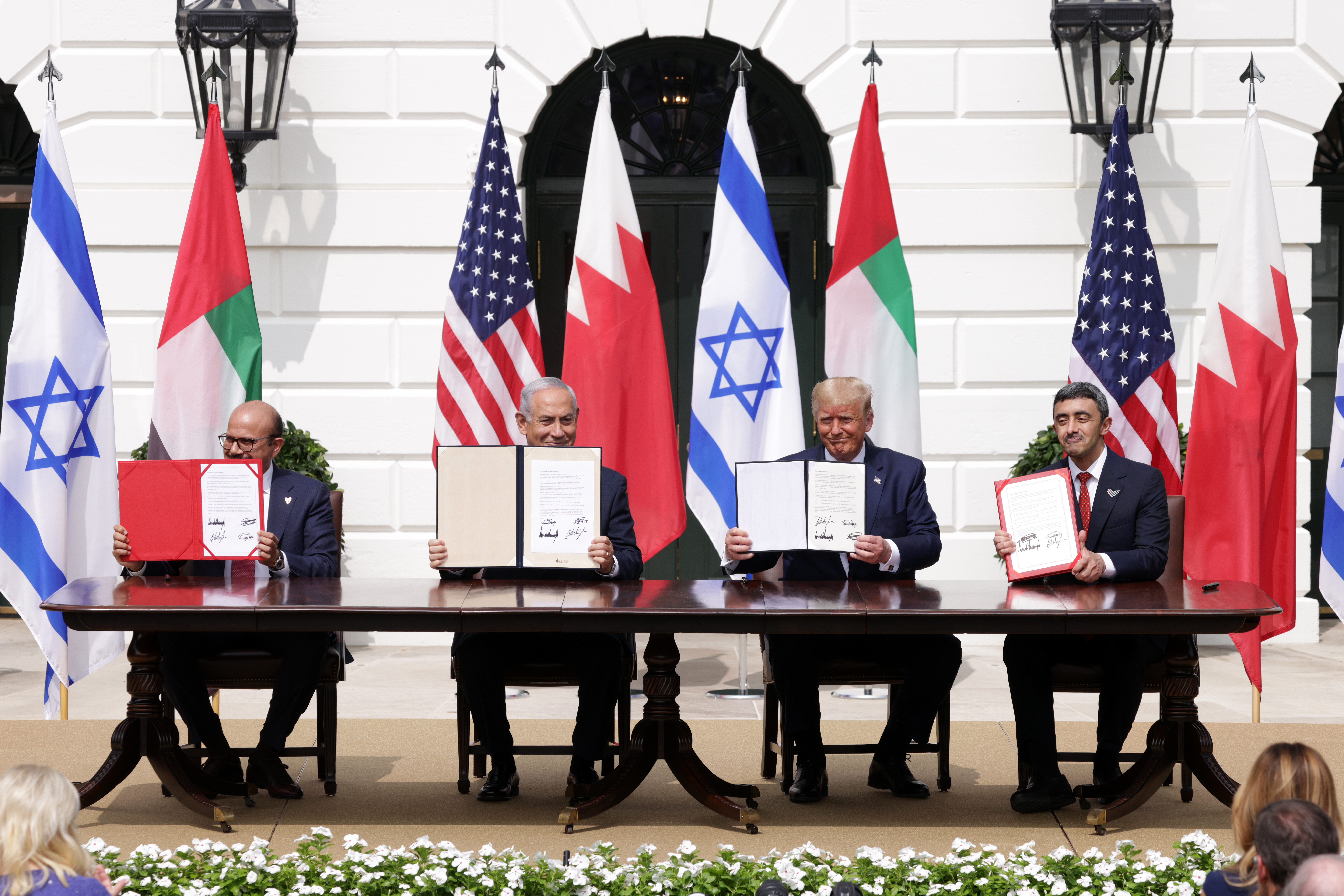Repeated aggressions would almost certainly push the Abraham Accords into a “cold” phase—formal on paper, but increasingly hollow in practice.
Introduction
For a long time, Qatar, just like the rest of the Gulf States, was seen as untouchable, a largely safe space for diplomacy and negotiation. The Gulf is seen as an island of stability, one that can mediate between conflict actors while being largely distant from it. Yet, that image was tested recently in June 2025 when Iran chose to strike U.S. interests on Qatari soil in retaliation for U.S. bombings of its nuclear sites during the Israeli campaign against it. Even with reportedly advance warning, the Iranian aggression set the tone for conflict coming home.
At the same time, Tehran’s support for an emboldened Hamas undermined the Doha-mediated negotiations with Israel, paving the way for their repeated collapse. These factors, in turn, prompted, though it can never be justified, Israel’s decision to carry out a precision strike against Hamas in Qatar. Notably, while Qatar was likely angry at Iran, it still chose to welcome the Iranian President Masoud Pezeshkian to Doha for an emergency Arab-Islamic summit in response to the Israeli attack: the two attacks are not seen as equal, as the Iranian one came with enough warning and did not kill anyone, while the Israeli one failed on both accounts.
A Prompt for Gulf Unity in the Face of U.S.-Israel Shortcomings
Israel’s strike against Qatar poses a serious challenge to the Abraham Accords. The risk for Israel is that all of the Gulf states rally behind their united GCC flag, perhaps even prompting more regional integration on foreign policy. Only two states out of six have normalized relations with Israel, which does not tilt the balance in its favor. Moreover, Israel may eventually find itself pushed into appeasing the Gulf as a bloc and having to push for a heavier task of seeking to normalize with the GCC as a whole, especially if it hopes to secure normalization with Saudi Arabia. The Kingdom is unlikely to take the risks Bahrain and the UAE took and counter public sentiment, which, after the strike on Qatar, is likely more anti-Israel than ever. Saudi Arabia will likely consider the need for all other countries to join it in any normalization effort. This would thin out any public reaction, and would require Qatari, Omani and Kuwaiti buy-in.
Another critical consideration is the erosion of confidence in the U.S. security guarantee in the Gulf… Washington may try to frame such lapses as exceptions tied to specific administrations, but Gulf leaders are unlikely to take that reassurance at face value.
Another critical consideration is the erosion of confidence in the U.S. security guarantee in the Gulf. This perception had already weakened after Washington failed to defend Saudi oil facilities during the 2019 attack attributed to Iran. The latest blow came when the U.S. provided Qatar with little to no warning of the Israeli strike—despite reports that Prime Minister Benjamin Netanyahu had notified his American counterparts barely an hour beforehand.
Over the long term, Washington may try to frame such lapses as exceptions tied to specific administrations, but Gulf leaders are unlikely to take that reassurance at face value. That is, even if enhanced defence cooperation agreements with the U.S. are scrambled to reassure them. Instead, they may accelerate efforts to build domestic arms industries, diversify suppliers, and reduce their reliance on U.S. security commitments. Such moves could also encourage the development of a more cohesive GCC defense architecture, as reflected in the planned GCC Joint Defence Council meeting in Doha, and lessen the likelihood of intra-Gulf rifts like the 2017–2020 diplomatic crisis.
Accelerating the Prospect of a “Cold Accords”
The U.S. relationship with the Gulf was pivotal in enabling the Abraham Accords, and Israel places high strategic value on its ties with the UAE and Bahrain. Yet these relationships remain fragile. The prospect of a “cold peace” or “Cold Accords” is ever-present, especially after the UAE recently signalled its willingness to scale back relations over the threat of West Bank annexation. Both Abu Dhabi and Manama openly condemned the Israeli strike on Qatar, and President Sheikh Mohammed bin Zayed’s immediate visits to Doha and Manama underscored the seriousness of their response. His stop in Bahrain in particular suggested an effort to coordinate at the highest level on how both states should recalibrate their relations with Israel in the wake of the attack.
Israel has jeopardized its standing with the Abraham Accords signatories. The Accords were never a binding alliance; they are a framework that ebbs and flows with circumstance.
Building more durable relations will therefore require patience and restraint. By striking Qatari territory—an integral part of Gulf sovereignty and stability—Israel has jeopardized its standing with the Abraham Accords signatories. The Accords were never a binding alliance; they are a framework that ebbs and flows with circumstance. The circumstances as they stand are not in favor of growth: both the UAE and Bahrain will see their national interests harmed by virtue of the political risk premium on any investments in the Gulf region following the Israeli attack. This alone, if not the need to showcase a brotherly-solidarity front in the Gulf, will be enough for a slowdown of the relationship between Israel and its Gulf partners, with reports already indicating that the UAE has barred Israeli firms from a Dubai Defence Expo in light of its aggression against Qatar. The UAE has also summoned the Israeli Deputy Ambassador, David Ohad Horsandi, to its foreign ministry to condemn the same, with the ambassador, Yossi Avraham Shelley, appearing to have left the country a while back over a row in a bar – or at least taking a backseat while continuing to reside in the UAE ever since.
Conclusion
For Gulf leaders—including the Abraham Accords signatories who are currently marking their fifth anniversary—the priority will be preventing any repeat of the Israeli strike on Qatar. Yet, Israeli Ambassador to the U.S. Yechiel Leiter declared after the attack: “We have put terrorists on notice, wherever they may be … we’re going to pursue them, and we’re going to destroy those who will destroy us.” Such rhetoric makes clear that Israel may contemplate similar actions in the future. For the UAE and Bahrain, repeated aggressions would leave little choice but to recalibrate their ties with Israel. They may not sever relations outright, but repeated aggressions would almost certainly push the Abraham Accords into a “cold” phase—formal on paper, but increasingly hollow in practice.
If Israel is to listen to its own President, Isaac Herzog, who has reportedly recently said that “the Abraham Accords are a watershed” and that “there should be no steps taken that should hurt these steps in any way”, then finding a peaceful resolution with Qatar will be essential. Otherwise, the fragile gains of the Accords risk eroding into little more than diplomatic symbolism.
This article originally appeared at The Institute for Peace & Diplomacy.











